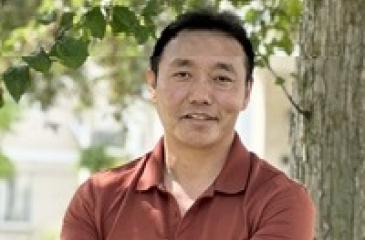Tenzin Namdul, TMD, PhD, was recently appointed Director of the Tibetan Healing Initiative at the Bakken Center for Spirituality and Healing. From 2020 to 2022 he was a postdoctoral scholar in the TRACT TL1 Program at CTSI. The TL1 training program integrates a mentored research experience, an individualized curriculum, and professional development activities that focus on team-based research and effective collaboration and communication with the larger community.
“In the CTSI TRACT TL1 program, we recruit scholars from a wide variety of disciplines and backgrounds to provide training and career development opportunities in team science, communicating science, community engagement and leadership to build their translational research skills,” said Jayne Fulkerson, program director.
Taking part in the training program during the height of the pandemic posed some unique challenges. “It was a challenge, but the CTSI faculty, especially Jayne [Fulkerson] and Angie [Angie Merrifield, program manager], and all the other team members, they did so well in making sure that we had not only regular Zoom meetings as a means of knowing each other's work, but also to provide enough support both socially and emotionally,” said Namdul.
His TL1 research project was an extension of his PhD dissertation work, which focused on end of life care in a Tibetan Buddhist population where, as one would expect, most of the study participants were elderly. One of the findings that came out of his dissertation work was the really strong amount of resiliency, both physically and mentally, in that population.
“When I had a chance to apply to the TL1 program, I thought there would be a great opportunity for me to extend my dissertation work,” he said. “And so my focus was on looking at an association between physical and cognitive resilience and neurodegenerative disorder, particularly Alzheimer's disease and related dementias. I wanted to look at what cultural factors come into play when we look at emotional or physical resiliency and its impact on Alzheimer's disease and related dementias.”
Namdul’s TL1 project title was “Factors Associated with Physical and Cognitive Resilience among a Large Tibetan Monastic Community in southern India.”
The TL1 program is set up so that each scholar has a primary and a secondary mentor, and he feels fortunate that he was able to have very supportive faculty both here at the University of Minnesota and at Washington State University in Seattle. His mentors – Richard MacLehose, PhD, UMN School of Public Health, and Dedra Buchwald, MD, Washington State University – were also working on Alzheimer's disease and related dementias, and its association with contemplative practices in the same population.
Dr. Buchwald’s work on community health, particularly in indigenous communities in Seattle and the northwest region, focuses on Native American communities. While the monastic population in Namdul’s research is not similar, there was a certain level of overlap. “And we got really excited about it because the whole purpose of a program like TL1 is to show you can do interesting research work and benefit a given population, but it can also be translated into our local community and into indigenous or underrepresented communities, such as a Native American community,” he said. “And that really added to my collaboration with my mentors.”
Namdul also discussed how his TL1 experience would aid him in his new role as Director of the Tibetan Healing Initiative.
“It really pleasantly surprised me, both for my academic trajectory as well as for me to grow as a person, because I realized over the course of time that the cohort that was put together and that I was part of was very diverse both academically and culturally,” he said. “And that was really helpful for someone like me, moving from India to the US and then relocating to Minneapolis from Atlanta. It helped me to kind of find my grounding here, and then being able to talk to people who have different stories and who have different experiences. And I felt more confident and comfortable sharing my trajectory, how I came here and where I came from.”
“And in addition to that, we certainly have very dynamic faculty at TL1 who put the effort into working so closely with each of our cohort members, our mentors, as well as other researchers or potential collaborators on campus,” he said. “That was really helpful. Every now and then Jayne or Angie or some of the other staff at CTSI, who were helping us coordinate things, would connect us to someone on campus. That really helped me to not only prepare myself as an individual scholar, but also being able to work with a team of very diverse academic backgrounds.”
Namdul is very appreciative of how well the TL1 program prepares participants for the transition from pre-doctoral to postdoctoral, or from postdoctoral to a faculty position. “For someone like me as a postdoctoral, it not only helped us get into a faculty position, but also how to be leaders in a health care setting in our own capacity,” he said. “And I think that's really critical. I think the TL1 program does such a good job of bringing out the leadership quality in each of the scholars, and produces new leaders in health care.”
Read about the Tibetan Healing Initiative in the Bakken Center’s article A New Vision for Tibetan Healing. To learn more about the TRACT TL1 program – which, in the future, will be referred to as the TRACT T32 program – visit the CTSI website. Applications for the next TRACT T32 cohort will be accepted in autumn 2023.
